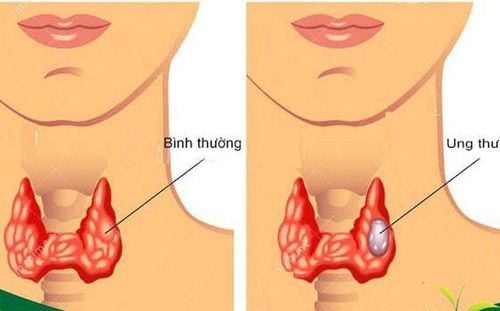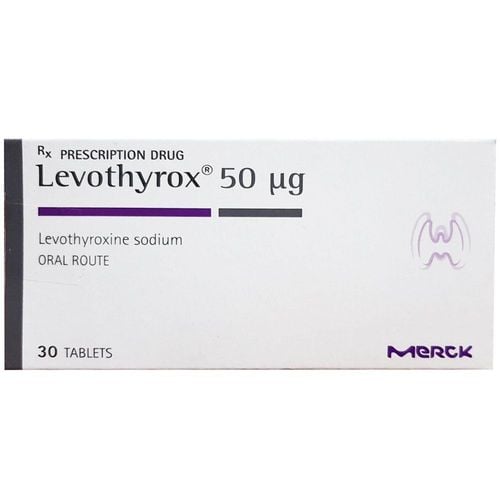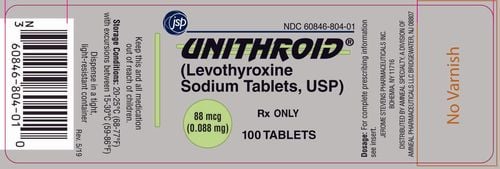This is an automatically translated article.
Inflammation of the pyelonephritis, also known as infectious thyroiditis, is very rarely caused by bacteria, fungi or parasites. Without timely understanding and treatment, the disease will leave dangerous complications.
1. Causes of pyogenic thyroiditis
Purulent thyroiditis usually occurs when there are favorable factors such as:
Congenital abnormalities (also lingual duct, sinus fistula) Pre-existing thyroid disease (thyroid cancer, Hashimoto's thyroiditis), multinodular goiter), advanced age or immunocompromised . Pyogenic thyroiditis usually arises from adjacent infections, through the bloodstream, lymphatic routes or from distant sites of infection.

Ung thư tuyến giáp có thể là nguyên nhân dẫn đến viêm tuyến giáp mủ
2. How many types of thyroiditis?
2.1 Subacute thyroiditis
Subacute thyroiditis, also known as subacute granulomatous thyroiditis, is the most common type of painful inflammation.
People with the disease often start with body aches, sore throat, low-grade fever. Then often suddenly or gradually appear high fever, pain in the neck area. From the outside, it can be seen that the thyroid gland is enlarged, tender to the touch, very painful, usually starting from one side and then spreading to the other side. Pain may spread to the ears, all over the neck, limited neck movement with symptoms of difficulty swallowing, difficulty breathing.
Symptoms of thyrotoxicosis are usually moderate or mild. After a few weeks, most patients will return to euthyroidism or develop mild, transient hypothyroidism.
2.2 Purulent thyroiditis
Pyogenic thyroiditis usually originates from nearby infections, via blood, lymphatic routes, or distant sites of infection.
Symptoms:
Swelling, redness on one side of the front of the neck. The thyroid gland is usually tender and very painful. The patient has a high fever, possibly chills, an infection. Difficulty swallowing or speaking. Laboratory tests:
Results of white blood cell count increased, erythrocyte sedimentation rate increased. Thyroid function is usually normal. Performing thyroid ultrasound, CT Scan of the patient's neck can see an abscess in the thyroid gland. The results of otolaryngoscopy can show a fistula in the abscess caused by a sinus fistula. Aspiration of pus, culture can isolate bacteria.
2.3 Hashimoto's thyroiditis
Hashimoto's thyroiditis also known as autoimmune thyroiditis, chronic lymphocytic thyroiditis is the main cause of hypothyroidism. The disease is common in women, at all ages, but usually concentrates in the age of 30 - 50.Symptoms:
Thyroid goiter: Most of the thyroid goiters appear large, firm, symmetrical and often painless, causing compression. feeling of choking in the neck, difficulty swallowing, hoarseness, ... Hypothyroidism: A common symptom in the late stage with manifestations such as fear of cold, constipation, slow pulse. Many cases of hypothyroidism are mild, manifesting primarily as disturbances in thyroid function tests. If the patient comes to the clinic early in the early stages, there may be symptoms of thyrotoxicosis, but it is usually mild and transient. Laboratory tests to detect disease:
Perform thyroid function tests: FT3, FT4, TSH, Anti-TPO. Patients were assigned thyroid ultrasound or thyroid cytology.

Siêu ấm tuyến giáp giúp chẩn đoán bệnh viêm tuyến giáp
3. Treatment of pyogenic thyroiditis
Use appropriate systemic antibiotics based on antibiogram, especially for severe inflammatory cases. When there is no antibiogram, it is possible to choose antibiotics sensitive to bacteria in the oral cavity such as high-dose penicillin G, ampicillin.. can combine with metronidazol or clindamycin if anaerobic infection is suspected.
With serious infections, suspected infections originating from distant infection sites, it is necessary to choose antibiotics sensitive to antibiotic-resistant staphylococcus, broad-spectrum antibiotics such as 3rd generation cephalosporins...
Any questions that need to be answered by a specialist doctor as well as customers wishing to be examined and treated at Vinmec International General Hospital, you can contact Vinmec Health System nationwide or register online HERE.













